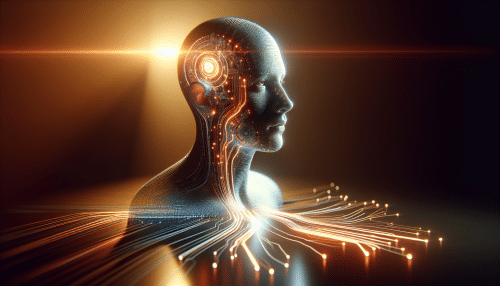How AI Is Used in Everyday Healthcare
Brian Taylor May 7, 2025
Artificial Intelligence (AI) is not just a futuristic concept anymore. It’s already reshaping the healthcare industry in exciting and innovative ways. From early disease detection to personalized treatment plans, AI is transforming healthcare as we know it. AI is used in everyday healthcare, improving patient outcomes, and making medical services more efficient. If you’re curious about how AI is being used in healthcare today, you’ve come to the right place.

Introduction to AI in Healthcare
Artificial Intelligence (AI) is a powerful tool in modern healthcare, helping improve diagnostic accuracy, personalize treatment, and reduce operational costs. AI is being integrated into healthcare at an accelerating pace, and its application is more diverse than ever. With AI’s growing presence in medicine, it’s clear that the future of healthcare will rely on these advanced technologies to deliver better and more accessible care.
How AI Enhances Diagnostics in Healthcare
AI is significantly improving diagnostic processes in healthcare. By analyzing vast amounts of data, AI can help detect conditions early and more accurately than ever before. Let’s dive into some of the key ways AI is transforming diagnostics in medicine.
AI-Powered Imaging Systems
AI has become indispensable in medical imaging. Deep learning algorithms now assist in analyzing X-rays, CT scans, and MRIs to detect abnormalities. This technology helps identify diseases like cancer, heart conditions, and neurological issues. AI tools have reached the point where they can detect issues such as cancerous growths, with an accuracy similar to, or even better than, human experts.
Recent research shows that AI can diagnose some cancers, like breast and skin cancer, with similar accuracy to human doctors (McKinney et al., 2020). AI’s ability to spot even the smallest irregularities in medical images means that diagnoses are made faster, leading to earlier interventions and better patient outcomes.
Personalized Treatment Plans through AI
AI is also making strides in personalizing healthcare. Traditional treatments often take a “one-size-fits-all” approach, but AI is changing that by tailoring treatment plans to individual patients. Here’s how it’s happening:
AI in Genomic Medicine
AI is transforming the way we approach genetic diseases. By analyzing patients’ genetic data, AI can predict which treatments will be most effective based on their unique genetic makeup. This means healthcare providers can offer more accurate and effective treatments, reducing the trial-and-error approach to medication.
Studies, such as those published in Nature Medicine (2021), show how AI-powered algorithms predict how a patient’s genes will react to different drugs, making the drug discovery process faster and more precise.
AI in Drug Development
AI’s role in drug development is another game-changer. Traditionally, creating new drugs is a long and expensive process. With AI, researchers can simulate how molecules will interact in the body, speeding up the discovery of new drugs. By doing so, AI helps pharmaceutical companies bring innovative drugs to market faster, improving patient care.
The COVID-19 vaccine development was one of the first major successes, where AI helped accelerate the process, demonstrating AI’s potential in drug development (Slaoui & Hepburn, 2020).
AI for Remote Monitoring and Care
Remote patient monitoring is one of the most exciting applications of AI in healthcare. Wearable devices and mobile health applications powered by AI are now widely used to track patient health metrics. These tools allow patients to receive care without leaving their homes, making healthcare more accessible.
AI in Wearable Health Devices
Devices like smartwatches and fitness trackers are now equipped with AI to monitor heart rates, blood pressure, and even blood sugar levels. AI analyzes this data in real time, alerting users to any concerning patterns, such as irregular heartbeats or abnormal blood sugar levels.
For example, the Apple Watch Series 6 uses AI-powered ECG features to detect signs of atrial fibrillation (AFib), a potentially dangerous heart condition. This allows doctors to intervene early, which can prevent serious complications.
AI’s Impact on Reducing Healthcare Costs
Healthcare can be expensive, and AI is helping make it more affordable. By automating administrative tasks and streamlining processes, AI reduces operational costs, making healthcare more affordable for both providers and patients.
AI in Administrative Efficiency
Administrative tasks like scheduling, billing, and patient record management take up a significant amount of healthcare resources. With AI, these processes are automated, saving healthcare professionals time and reducing the risk of human error. This means patients can receive more focused care, and healthcare providers can operate more efficiently.
According to Accenture (2020), AI could save the healthcare industry up to $150 billion annually by cutting administrative costs.
AI and Predictive Healthcare
AI is also making healthcare more proactive by predicting when and where services will be needed. By analyzing patient data, AI models can forecast health issues before they become serious, enabling doctors to intervene early. These predictions help hospitals and healthcare systems allocate resources more efficiently, leading to better outcomes and reduced costs.
Challenges and Ethical Considerations in AI Integration
While AI brings many benefits to healthcare, it also raises important ethical and privacy concerns. Let’s look at some of the key challenges that must be addressed.
Data Privacy Concerns
AI relies on vast amounts of data, including sensitive health information, which raises concerns about patient privacy. Although regulations like HIPAA (Health Insurance Portability and Accountability Act) are in place to protect this data, the growing use of AI in healthcare means that more stringent measures must be taken to ensure data security.
Algorithmic Bias
Another challenge with AI in healthcare is algorithmic bias. If AI algorithms are trained on biased data, they may unintentionally perpetuate existing healthcare disparities. Ensuring that AI models are trained on diverse and representative data is critical to preventing these biases from affecting patient care.
Conclusion: AI’s Role in the Future of Healthcare
Artificial Intelligence is reshaping the healthcare landscape, from improving diagnostics and personalizing treatment to making healthcare more accessible and affordable. While challenges remain, especially regarding privacy and bias, AI’s potential to revolutionize healthcare is undeniable. As technology continues to advance, AI will play an even more central role in improving patient care and making healthcare systems more efficient.
References:
- McKinney, S. M., et al. (2020). “International evaluation of an AI system for breast cancer screening.” Nature, 577, 89-94. https://doi.org/10.1038/s41586-019-1799-6.
- Slaoui, M., & Hepburn, M. (2020). “Developing Safe and Effective Covid Vaccines — Operation Warp Speed’s Strategy and Approach.” New England Journal of Medicine, 383, 1701-1703. https://doi.org/10.1056/NEJMp2027405.
- Accenture (2020). “Artificial Intelligence in Healthcare: The Opportunity.” Accenture Health.





